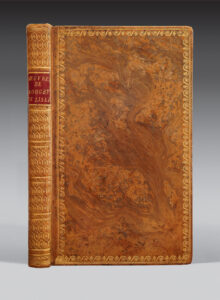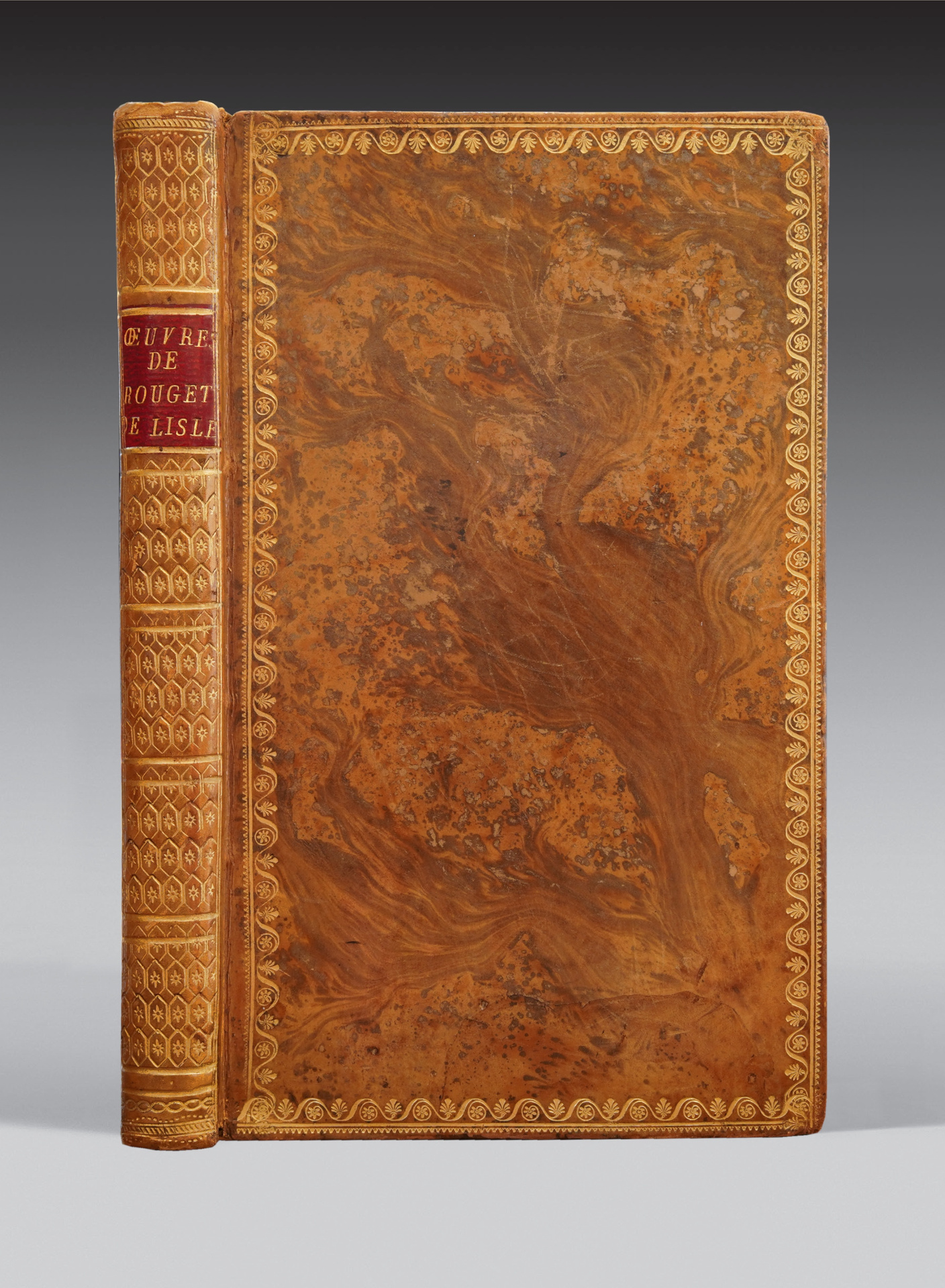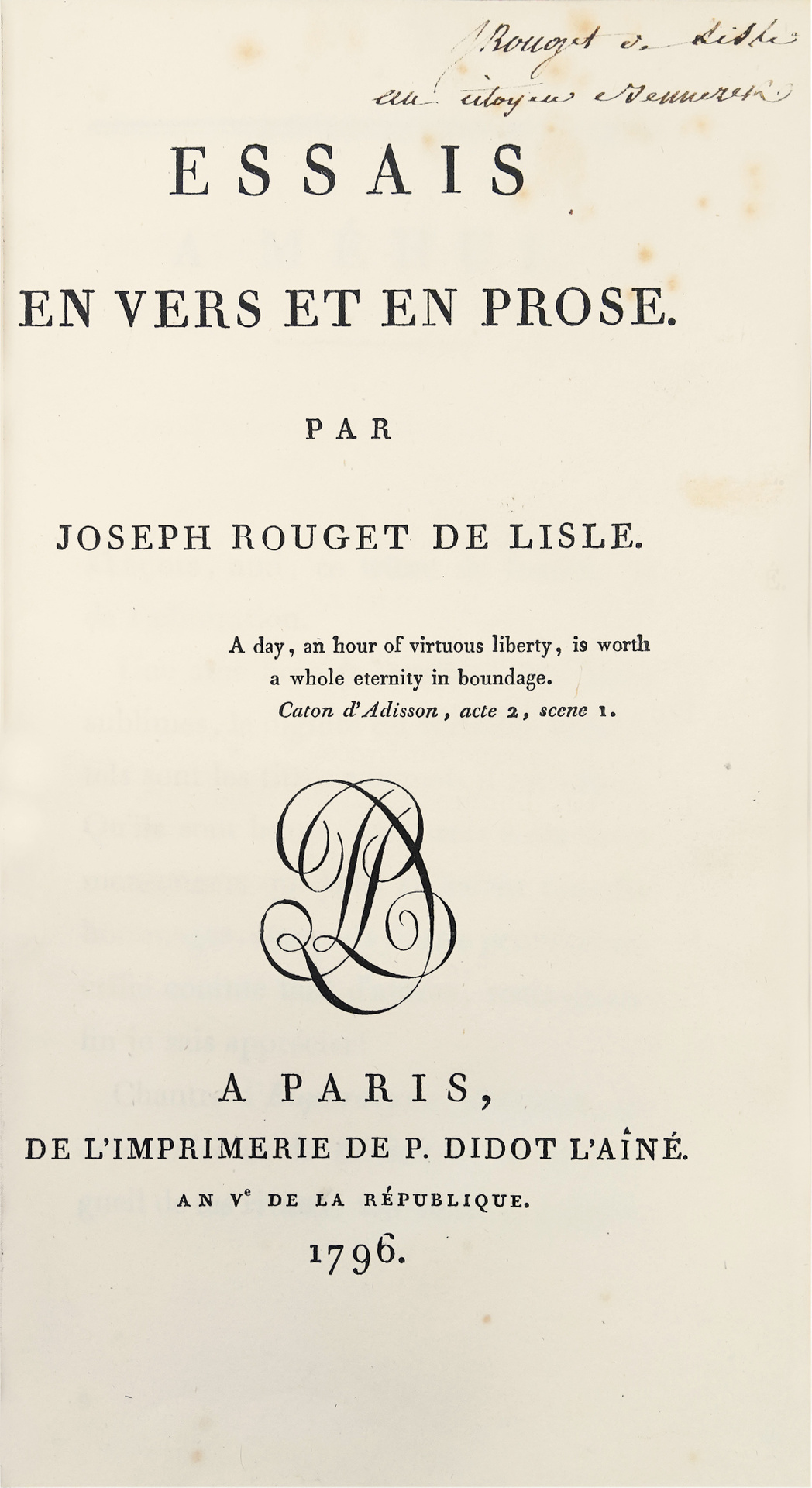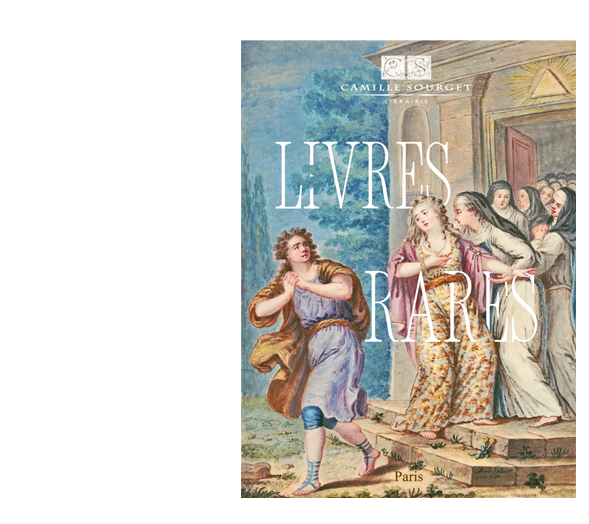A Paris, de l’Imprimerie de P. Didot l’aïné, 1796.
8vo [190 x 109 mm] of (2) ll., 157 pp., 5 pages of engraved scores, 1 engraving out of text. Blond calf, small gilt border around the covers, smooth spine finely decorated, red morocco lettering piece, sprinkled edges. Contemporary Binding.
First edition of the first book by Rouget De Lisle to present the couplets of the Marseillaise.
It was composed both for the words and for the music, during the night of April 24-25, 1792, in Strasbourg, at the home of the mayor of the great Alsatian city, Dietrich, by Claude Joseph Rouget de Lisle (1760-1836), a simple captain of the engineering corps, native of the Jura. On June 22 of the same year, in Marseille, a medical student from Montpellier, François Mireur, sang the song at a banquet for the volunteers of the Marseille battalion who were preparing to leave for the defense of their country. From town to town, wherever they went, the Marseillais sang it with passion.
The Marseillaise appears here for the first time in a volume entirely due to Rouget de Lisle and bearing his name. It is in six stanzas, as he composed it. Title: « Le Chant des Combats, vulgairement L’Hymne des Marseillois. Aux Mânes de Sylvain Bailly, premier maire de Paris ».
“On July 30, 1792, the 516 men composing this battalion of Federals entered Paris: guided by Santerre “they emerged on the Bastille square, drums beating, tricolor flag unfurled, at a martial pace, singing the hymn, still unknown in Paris, of the army of the Rhine” (Ph. Sagnac, la Révolution, 1789-1792, “Histoire de France contemporaine”, by Lavisse).Tears,” says Father Duchesne d’Hébert, “flowed from all the eyes; the air resounded with cries of: Long live the Nation / Long live liberty!” From then on, the hymn was called Chanson des Marseillais, then, by abbreviation, Marseillaise. Sung on August 10 of the same year, still by the Marseillais battalions, when they invaded the Tuileries, adopted by the soldiers of the Republic, by those “Volunteers of 92”; it is present on the battlefields. On October 17, the Convention decided to make it the Anthem of the Republic.
Decreed national song the 26 messidor year III (July 14, 1795), this title will be confirmed to him; at the beginning of the Third Republic, following a debate in the Chamber of the Deputies, on February 14, 1879. Song of the invaded country, the Marseillaise says the love of the home, the sweetness of the countryside threatened by the enemy from outside; it calls for just vengeance, for courage, for heroism; it proclaims death rather than shame. Spontaneously springing from the hearts, it was a rallying sign in victory as in defeat. ”
“It is a revolutionary song, coming out of the bowels of a sovereign people, in love with freedom and brotherhood, and it sounds the hour of the fight against all forms of tyranny, against all faces of oppression. As such, it was sung throughout Europe by the revolutionary troops in the assault on the monarchy and the old regime, in this sense, it is, as Michelet said, “an eternal song added to the voice of the nations.”
This collection also contains in prose Adélaïde de Monville, with a beautiful engraving by Gaucher after Lebarbier, in first issue. At the end : “Chant de l’Hymne à l’Espérance. Gravé par Richomme”, that is this title and 5 pages of engraved words and music.
Precious copy printed on fine vellum paper, preserved in its contemporary binding, one of the few containing a signed autograph dedication from Rouget de Lisle on the title « J. Rouget de Lisle au citoyen Bennezek ».
From the libraries of Guilbert de Pixérecourt (Crozet, 1838, n°705 of the catalog) and of Doctor Lucien Graux with ex-libris (n°155 of the catalog of the sale of 18 June 1958).



